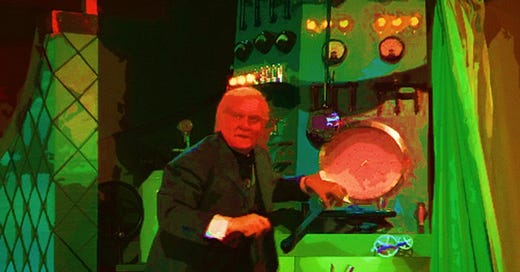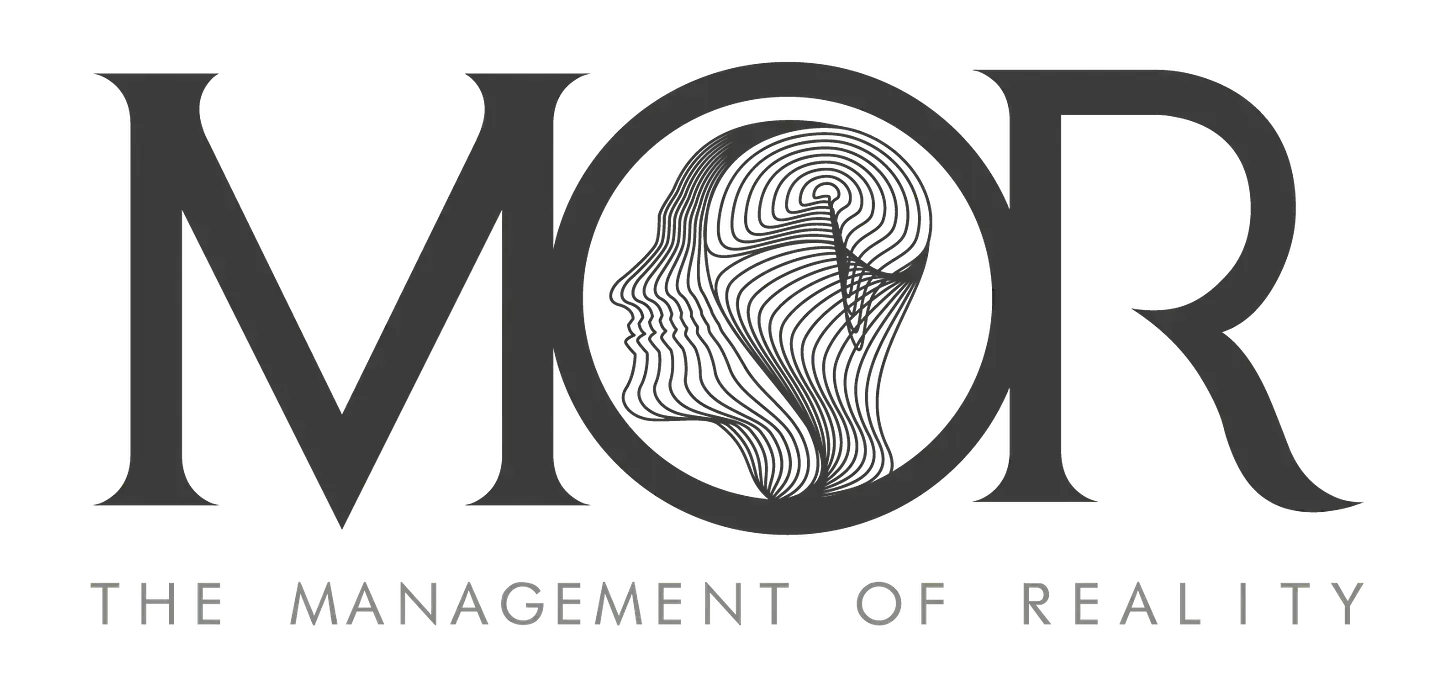WEIRD: Is the taboo on conspiracy theory the key Machiavellian move in the meaning wars?
The conspiracy-theory taboo undermines social science and democratic politics
Imagine a conspiracy to make everybody believe that conspiracy theories are always nuts. To what end? To turn the categorical and universal denial of conspiracies into a proud mark of intelligence—and thereby hide all conspiracies. But could that succeed? It already has.
The conspiracy theory taboo is the moral prohibition—imposed by our meaning-makers in media and academia—on the consideration of Machiavellian hypotheses that allege the involvement of our powerful Western bosses in underhanded, narratively camouflaged, and even secret activities to wreck our democracies and enslave us.
Why are theories in this category disallowed? Some conspiracy theories—most, in fact—will surely be wrong. But this is true of any field of inquiry (including physics). Since other fields of inquiry are not indicted on such grounds, what is going on here?
I will consider that question. And I will explain how this taboo wrecks social science and democratic politics.
But let us begin, by way of introduction, with the WEIRD context, as the conspiracy-theory taboo cannot really be grokked without it.
The taboo on conspiracy theory is WEIRD
WEIRD (in uppercase) is a technical, social-science acronym. It stands for Western, Educated, Industrialized, Rich, and Democratic. It is important here because the taboo against considering Machiavellian hypotheses is a feature of WEIRD societies, possessors of a unique culture.
I am now very interested in WEIRD societies. This was unexpected. Like many other anthropologists, I started out chiefly interested in the exotic, small-scale, non-Western society: the Not Overly Ranked or Mechanized, Autochtonous Locals (the NORMAL’s). I still find NORMAL societies interesting. But I am also fascinated, now, by the culture of my own people, natives of my own WEIRD world.
That famous acronym, WEIRD, was coined by my friend, Harvard anthropologist Joe Henrich. It’s so clever it made me green with envy. So I just had to respond with my own coinage: NORMAL (I won’t let Joe get all the acronymic glory!).
Anyway, Joe’s acronym is perfect, because, as Joe and his colleagues have extensively documented, our modern WEIRD societies are indeed weird: our peculiarities are difficult to find in the rest of the world, or, indeed, in Western societies of the past.1 Something strange is going on here in the West ever since the European Enlightenment. And the ethnographer, coming back from an alien field site—as happened to me when returning from rural Mongolia—can see it best: we are the aliens.
But Joe’s acronym needs an annotation: the WEIRD culture he is talking about—the one he and I both belong to—is not simply Western but a subculture within the West: the university-trained middle and upper classes (which fits perfectly with the WEIRD acronym because the ‘E’ stands for ‘Educated’ and the ‘R’ for ‘Rich’).
I call members of my tribe Politers: natives of Western ‘polite society.’
Members of other cultures, and non-Politer working-class Westerners, are often astonished by this prominent WEIRD feature of Politer morality: the conspiracy-theory taboo. I think anthropologists should investigate how this taboo organizes many curious rules of Politer etiquette, revealed in action when strict respect for the conspiracy-theory taboo is challenged. Following my own advice, I have elsewhere tried to describe this social grammar.
But here I pursue a different quarry: the harm that the conspiracy-theory taboo does to both social science and to the protection of our democratic rights and liberties.
I will begin by looking at how social scientists typically discuss conspiracy theory. And for that, nothing better than a native informant: a political scientist reflecting on these very cultural aspects of her own academic sub-tribe.
A political scientist reflects on the costs of this taboo
The conspiracy-theory taboo is authoritatively transmitted and most strongly enforced in the Western university. To get more and more university education is therefore progressively to squeeze out any lingering social excuse to consider Machiavellian hypotheses. Academics with Ph.D.’s are therefore least free to do so—especially if they live and work, as so many do, in a university.
So, whereas the occasional lawyer or businessperson may dabble in Machiavellian hypotheses and endure no more than frowns and light jests, a university professor doing the same is risking angry rebukes and full ostracism. If such leanings become known during the ‘Assistant Professor’ probation period, one may never get tenure. And a graduate student will most certainly not be allowed to defend a Machiavellian hypothesis in a Ph.D. thesis.
All of the above goes double—even triple—for political scientists. Oh yes. I can understand that you might have thought, in your naivete, that political scientists would be the frontline specialists investigating possible Machiavellian activities of the powerful—but no. As one of them confesses:
“It is only rarely that conspiracy thinking moves from the political fringe into the mainstream … [because] one is tempted to dismiss all talk of conspiracy prima facie as no more than ramblings of a handful of paranoids.”2
The above was written by Judith Grant, a political scientist, in an essay that—in anthropological context—is remarkable. First, because she titled it ‘Taking Conspiracy Theory Seriously.’ And second, because she published it in the academic journal New Political Science (2019). Unheard of.
Anyway, the persistence over the last several decades of this conspiracy-theory taboo, Grant observes, is at least curious because major conspiracies perpetrated by our Western bosses—operations of astonishing breath and criminality—have in point of historical fact been very publicly exposed during the same decades. For example,
“the many Central Intelligence Agency (CIA) covert operations designed to topple communist-backed governments, or the experiments carried out against Americans by the CIA in the mid-twentieth century such as those nested under its MKUltra programs. Any of these would sound like the work of conspiracy theorists but for the fact that we came to know that they actually happened, only because the parties themselves confessed or secret evidentiary documents were leaked to the press.”
MKUltra, the CIA’s infamous ‘mind control’ program, which attempted to deprive flesh-and-blood humans of their will in order to make of them guided automatons (‘Manchurian candidates’), is the sort of thing you’d expect from a James Bond film, say. Or, if forced to consider it as happening in the real world, you’d expect it from a nightmare totalitarian state such as North Korea.
But it happened in the United States of America.
When Grant says this “sound[s] like the work of conspiracy theorists” she means something imagined by lunatics, because when Politers like herself hear a Machiavellian hypothesis they inwardly think: ‘crazy and wrong.’
Yet ‘crazy’ ideas are often right. ‘Crazy’ is simply how we evaluate whatever is outside our dominant paradigm, and sometimes the paradigm itself is what needs changing. But problems with a dominant paradigm are difficult if you’ve been schooled to interpret, incorrectly, that ‘crazy’ always equals ‘wrong.’
And so…
Social scientists study the conspiracy theorist, not the theory
The question for social scientists is rarely: Does this conspiracy theory make sense? More commonly, they simply presume all conspiracy theories to be false and ask: Why is it that uneducated people believe conspiracy theories? Machiavellian hypotheses are thus interpreted not as possibilities worth investigating but as symptoms of a social and psychological malady—called ‘conspiracism’—which afflicts mostly those with fewer years of education, who are but one step away from paranoid personality disorder.
As a typical offering, consider the paper, ‘Conspiracy Theory and Cognitive Style: A Worldview,’ by Neil Dagnall and colleagues, published in Frontiers in Psychology (2015). The authors write:
“The study of conspiracism is important for myriad reasons. Conspiracy theories persist within the general population (Goertzel, 1994), are frequently endorsed, and may influence perceptions of significant contemporary (e.g., transmission of ebola) and historical real world events (e.g., moon landings; Swami et al., 2010). … Whilst, conspiracy theories are not always false (e.g., Watergate), they typically lack evidential support and are generally resistant to falsification (Sutton and Douglas, 2014). Thus, the fact that conspiracies gain social support demonstrates the appealing, persuasive, and plausible nature of conspiracist ideas (Byford and Billig, 2001). Belief in conspiracies may also effect behavior and have important social consequences, such as diminished social engagement (society, politics, health behaviors, climate change, etc.; Butler et al., 1995; Bird and Bogart, 2005; Jolley and Douglas, 2014).”3
Notice all of the following.
First, the claim that conspiracy theories “typically lack evidential support and are generally resistant to falsification” is, I submit, a polite way of alleging that conspiracy theorists are stubborn fanatics without evidence to support their claims.
Yet, Dagnall et al observe, conspiracy theorists are numerous because, they say, conspiracy narratives are “appealing, persuasive, and plausible” to “the general population.” By ‘general population’ they mean those without a ‘proper’ university education (less than 37% of US citizens have college degrees, and many of those are from small community colleges that don’t qualify a person for true membership in polite society).
These authors worry that “conspiracy theories … are frequently endorsed” because this may “influence perceptions of significant contemporary … and historical real world events,” yielding “important social consequences, such as diminished social engagement” with the recommendations of our bureaucratic authorities on issues of “society, politics, health behaviors, climate change, etc.” In the considered opinion of these authors, one must counter this…, well, disobedience, and that’s why “the study of conspiracism is important.”
Yet one is forced to wonder. Given:
that we cannot know whether a Machiavellian hypothesis has “evidential support” until it is investigated; and
that social scientists typically do not investigate conspiracy theories,
then how do Dagnall et al know that “conspiracy theories … typically lack evidential support”?
It is a poignant question because Dagnall and colleagues concede (in passing) that “conspiracy theories are not always false (e.g., Watergate).” Oh…! Well, in that case, investigating Machiavellian hypotheses ought to be considered a legitimate social-scientific activity. This is not a subtle argument.
Now, about that Watergate concession…
Isn’t it curious that when Politers concede some conspiracies do happen, as Dagnall et al do above, Watergate is always the example trotted out? Why is that?
I think this is why: Watergate is grammatical.
In other words, Watergate can be fitted into the rules of Politer etiquette: you can concede Watergate without having to challenge the entire normative cultural edifice built around the conspiracy-theory taboo. The two main reasons:
Watergate is not only well documented but very famous—it would be foolish to deny it.
Watergate is tame: nothing more than President Richard Nixon’s coverup of a politically motivated burglary—not a big deal, when everything is said and done.
It is therefore ‘proper,’ in Politer social grammar, to concede Watergate with one hand whilst denying all validity, with the other, to the ‘truly crazy’ theories that allege massive fiddling with our consensus reality (for example, “[faked] moon landings”) or that allege acts of astonishing criminality (for example, biowarfare attacks against civilians, as in the “transmission of ebola”).
In other words, a Politer may concede Watergate and still say convincingly—and normatively—that ‘I am not a conspiracy theorist.’ And that is what Dagnall et al. are saying to their readers, and, most importantly, to their Politer editors (who must agree to publish Dagnall et al): ‘We, Dagnall et al, are not conspiracy theorists.’
This, however, is just an identity signaling ritual in Politer grammar, a bit like a ‘secret-handshake’ that Politers exchange to reassure each other, semi-subliminally, that they are proper members of the tribe. It has absolutely nothing to do with establishing a proper context for doing science.
The latter point is easily demonstrated.
Suppose we step way out of the usual grammar to concede, not Watergate (again, just a covered-up burglary), but any of the following:
the CIA’s infamous mind-control program MKUltra;
or the CIA’s program to send billions in weapons to the number one terrorist enemy of the United States (the Iran-Contra Affair);
or the CIA’s seemingly permanent and large-scale clandestine interventions to control the press.
If you concede any of those, then claims of faked moon landings and Ebola biowarfare attacks will not sound quite so absolutely unimaginable.
I don’t know a thing about Ebola, specifically. But I do know that biowarfare attacks by the US military against US civilians are not speculation. In fact, it was documented in the period 1975-1977, in the US Congress, that the US military had been conducting, in secret, at least 239 open-air ‘tests’ over populated areas, spraying millions of US citizens with experimental bioweapons. (I did write ‘millions’—you read correctly.)
Is this outlandish? Perhaps. But it happened.
Suppose, then, that Dagnall and colleagues, when conceding that “conspiracy theories are not always false,” had mentioned, not Watergate, but those US-Army biowarfare attacks on US citizens. In such a case Dagnall et al would have to agree that ‘conspiracism’—to them, a pathology—is in fact a rational activity. For if the US government has sprayed in secret millions of its own citizens with experimental bioweapons, then rational Western citizens ought to wonder—in utter rationality—what other criminal activities their governments might be engaged in.
But Dagnall et al. concede only Watergate. And this is grammatical: it’s what Politers normatively do. And that’s why all US citizens have seemingly heard about Watergate but hardly anyone has heard about the biowarfare ‘tests.’
The taboo’s effect on democracy
The nefarious secret conspiracies of the powerful contribute to undermine democratic processes by canceling citizen rights and liberties, thus despoiling citizens of their sovereignty, turning them into subjects if not slaves. The biowarfare experiments of the 1950-60s, for example, violated the sacrosanct Nuremberg Code and turned millions of US citizens into lab rats! (So did the experimental mRNA COVID shots, which were forced on us.)
The preservation of our Western democratic structure, of our citizen rights and liberties, of our very sovereignty, requires, therefore, that even if many Machiavellian hypotheses will turn out to be false, they should be aggressively investigated. As philosopher Charles Pigden observes:
“[A] world in which conspiracy theories are not routinely dismissed will be a world in which genuine conspiracies are less likely to escape detection and hence a world in which they are less likely to succeed. And that would be a better and more democratic world, a world in which the powerful would be less likely to get away with murder—whether figuratively or literally.”4
But conspiracy theories are routinely dismissed because university professors believe that Machiavellian hypotheses are—as a category—not merely rank nonsense but distasteful, unseemly, uncouth, sordid, ridiculous.
And university professors educate all Politers.
By the time Politers graduate, they have got the message: intelligent, refined, and educated people, that is, cultured members of polite society, people holding a university degree, don’t go around proposing conspiracy theories. ‘Impolite’ rednecks do that. One must keep away from conspiracy theories the way one steers clear of the third rail in a New York subway station: there is a big red sign there warning that you will be electrocuted.
If a stray maverick should disregard that caution, they’ll be sternly dissuaded by the relevant editor or Ph.D. committee. The culture—policed in academia by university professors and elsewhere by their obedient graduates—thus reproduces itself.
The effect is powerful, and general. Because Politers, because of their university training, occupy the key meaning-making roles in the leadership, educational, and managerial hierarchies of our modern, bureaucratic, Western societies. Every source of mainstream authority therefore ends up repeating the message: conspiracy theory is taboo.
In this ecology, with no mainstream investigators looking for them, conspiracies can be hidden in plain sight, like the gorilla in the famous Simons & Chabris attention experiment. Hence, the stronger the enforcement of the conspiracy-theory taboo, the more conspiracies there are likely to be. This is not a subtle argument.
Free minds are thus brought to the obvious hypothesis: Might not the conspiracy-theory taboo itself be the product of deliberate manipulation by the powerful? Couldn’t this be a sophisticated tool, a deliberate stratagem? Might this not, indeed, be the key Machiavellian meaning move employed in the management of our reality?
If so, then university professors in the social sciences, like the eunuch mercenary slaves of yore, are fighting to protect the authority that has castrated them.
Henrich, J., Heine, S. J., & Norenzayan, A. (2010). The weirdest people in the world?. Behavioral and brain sciences, 33(2-3), 61-83.
https://scholar.harvard.edu/files/henrich/files/henrich_heine_norenzayan_2010-2.pdf
Grant, J. (2019). Taking Conspiracy Theory Seriously. New Political Science, 41(3), 476-478.
https://www.tandfonline.com/doi/abs/10.1080/07393148.2019.1631579?journalCode=cnps20
Dagnall, N., Drinkwater, K., Parker, A., Denovan, A., & Parton, M. (2015). Conspiracy theory and cognitive style: a worldview. Frontiers in psychology, 6, 206.
https://www.frontiersin.org/articles/10.3389/fpsyg.2015.00206/full
Pigden, C. (2014), introduction to: Dentith, M. (2014). The Philosophy of Conspiracy Theories. Palgrave Macmillan UK. Kindle Edition.










